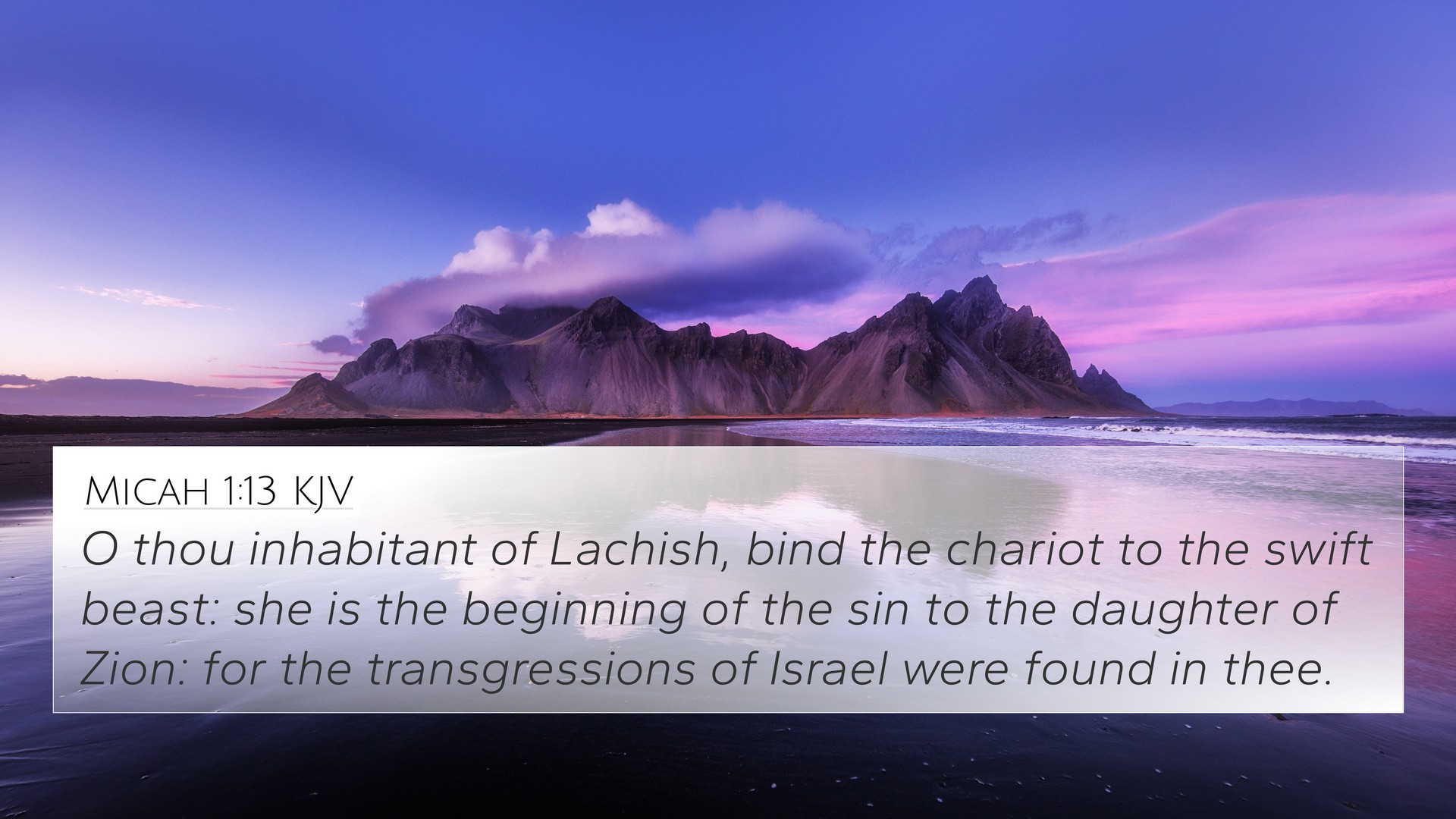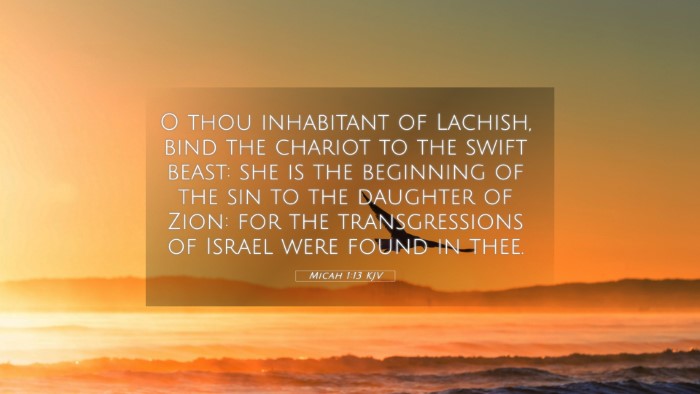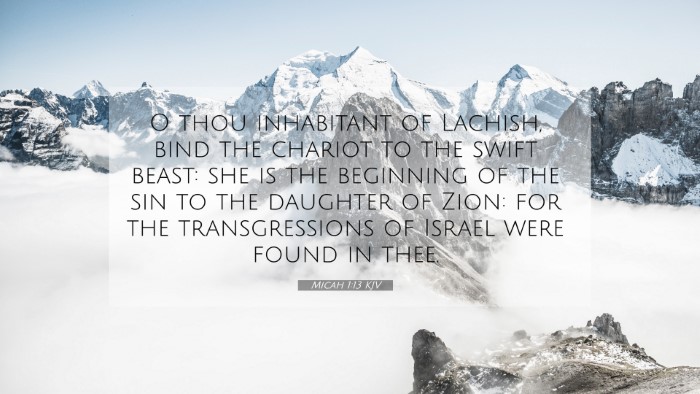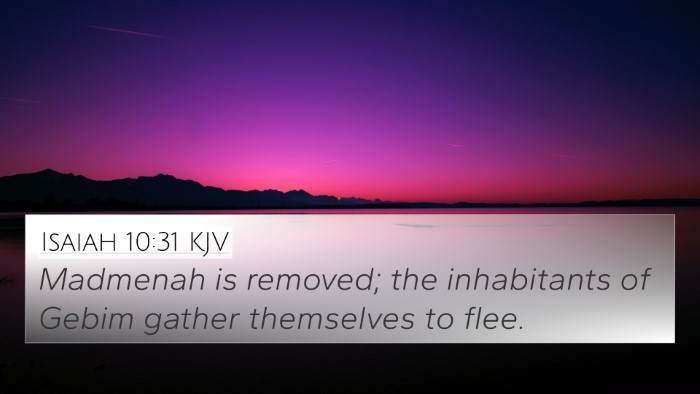Old Testament
Genesis Exodus Leviticus Numbers Deuteronomy Joshua Judges Ruth 1 Samuel 2 Samuel 1 Kings 2 Kings 1 Chronicles 2 Chronicles Ezra Nehemiah Esther Job Psalms Proverbs Ecclesiastes Song of Solomon Isaiah Jeremiah Lamentations Ezekiel Daniel Hosea Joel Amos Obadiah Jonah Micah Nahum Habakkuk Zephaniah Haggai Zechariah MalachiMicah 1:13 Similar Verses
Micah 1:13 Cross References
O thou inhabitant of Lachish, bind the chariot to the swift beast: she is the beginning of the sin to the daughter of Zion: for the transgressions of Israel were found in thee.
Uncover the Rich Themes and Topics of This Bible Verse
Listed below are the Bible themes associated with Micah 1:13. We invite you to explore each theme to gain deeper insights into the Scriptures.
Micah 1:13 Cross Reference Verses
This section features a detailed cross-reference designed to enrich your understanding of the Scriptures. Below, you will find carefully selected verses that echo the themes and teachings related to Micah 1:13 KJV. Click on any image to explore detailed analyses of related Bible verses and uncover deeper theological insights.
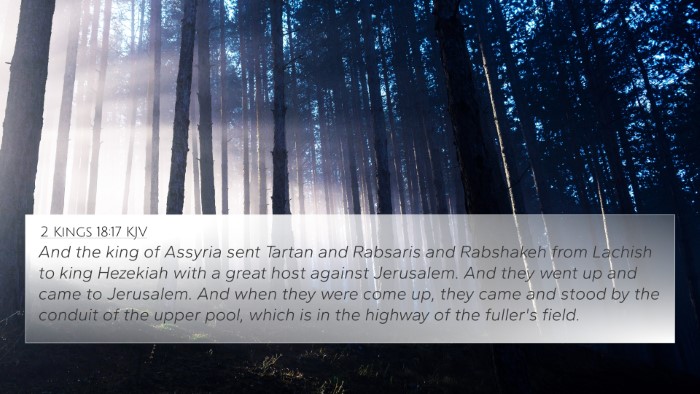
2 Kings 18:17 (KJV) »
And the king of Assyria sent Tartan and Rabsaris and Rabshakeh from Lachish to king Hezekiah with a great host against Jerusalem. And they went up and came to Jerusalem. And when they were come up, they came and stood by the conduit of the upper pool, which is in the highway of the fuller's field.
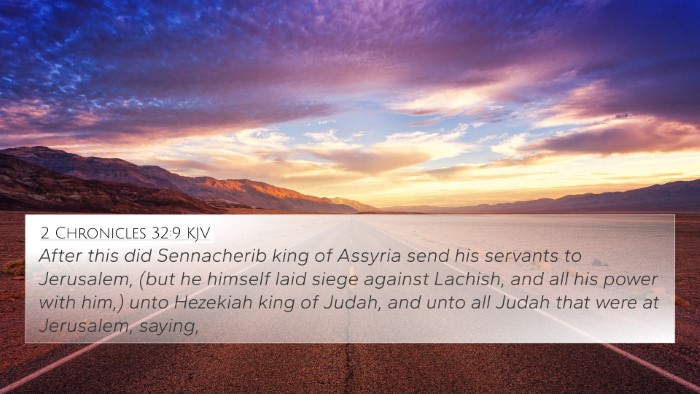
2 Chronicles 32:9 (KJV) »
After this did Sennacherib king of Assyria send his servants to Jerusalem, (but he himself laid siege against Lachish, and all his power with him,) unto Hezekiah king of Judah, and unto all Judah that were at Jerusalem, saying,
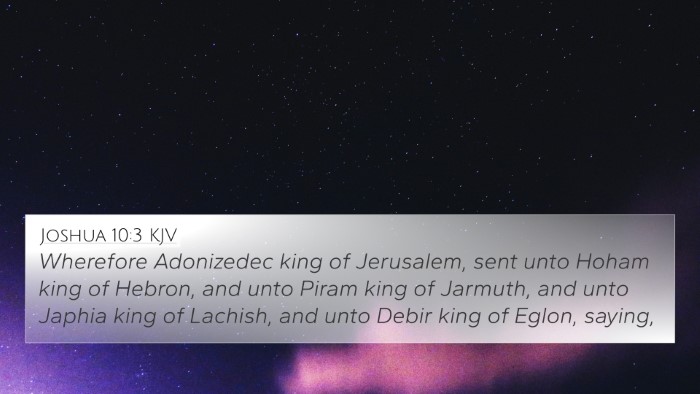
Joshua 10:3 (KJV) »
Wherefore Adonizedec king of Jerusalem, sent unto Hoham king of Hebron, and unto Piram king of Jarmuth, and unto Japhia king of Lachish, and unto Debir king of Eglon, saying,
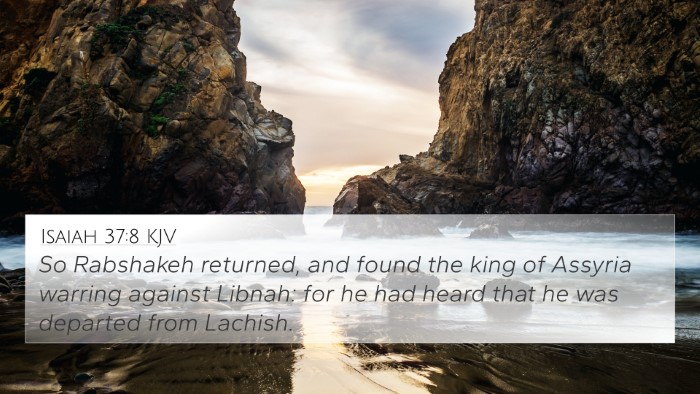
Isaiah 37:8 (KJV) »
So Rabshakeh returned, and found the king of Assyria warring against Libnah: for he had heard that he was departed from Lachish.
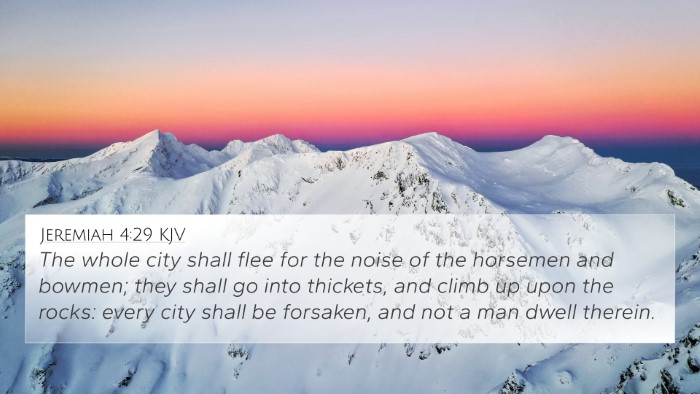
Jeremiah 4:29 (KJV) »
The whole city shall flee for the noise of the horsemen and bowmen; they shall go into thickets, and climb up upon the rocks: every city shall be forsaken, and not a man dwell therein.
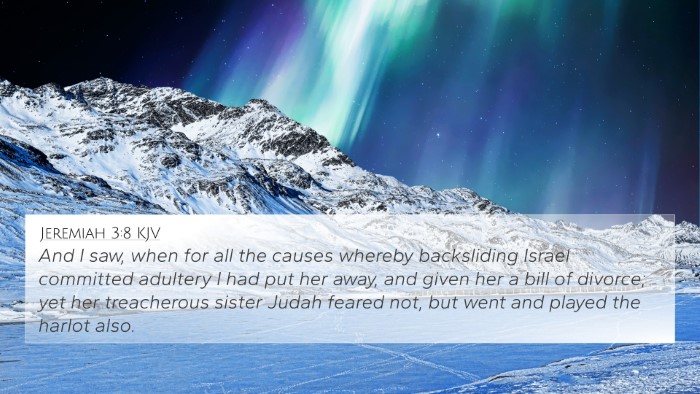
Jeremiah 3:8 (KJV) »
And I saw, when for all the causes whereby backsliding Israel committed adultery I had put her away, and given her a bill of divorce; yet her treacherous sister Judah feared not, but went and played the harlot also.
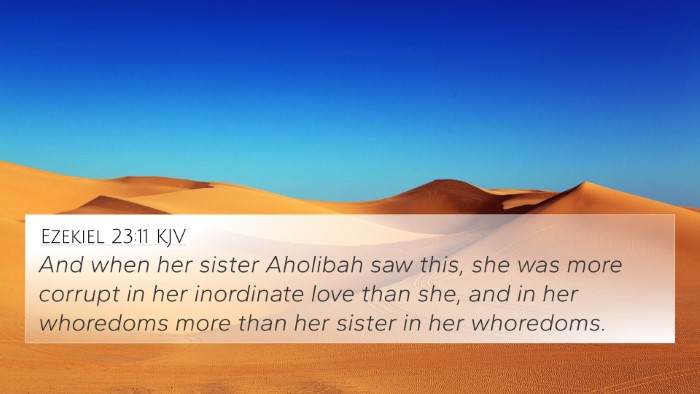
Ezekiel 23:11 (KJV) »
And when her sister Aholibah saw this, she was more corrupt in her inordinate love than she, and in her whoredoms more than her sister in her whoredoms.
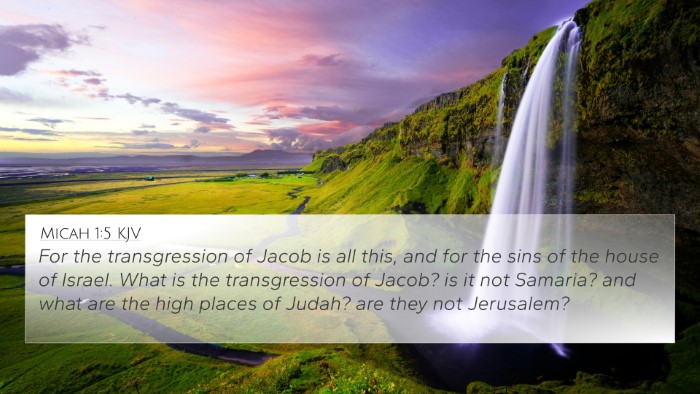
Micah 1:5 (KJV) »
For the transgression of Jacob is all this, and for the sins of the house of Israel. What is the transgression of Jacob? is it not Samaria? and what are the high places of Judah? are they not Jerusalem?
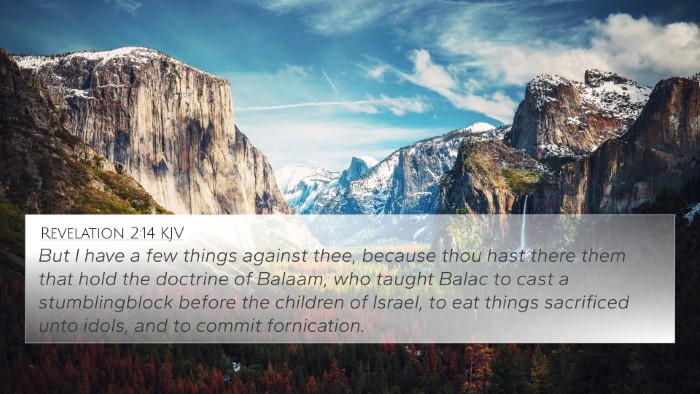
Revelation 2:14 (KJV) »
But I have a few things against thee, because thou hast there them that hold the doctrine of Balaam, who taught Balac to cast a stumblingblock before the children of Israel, to eat things sacrificed unto idols, and to commit fornication.
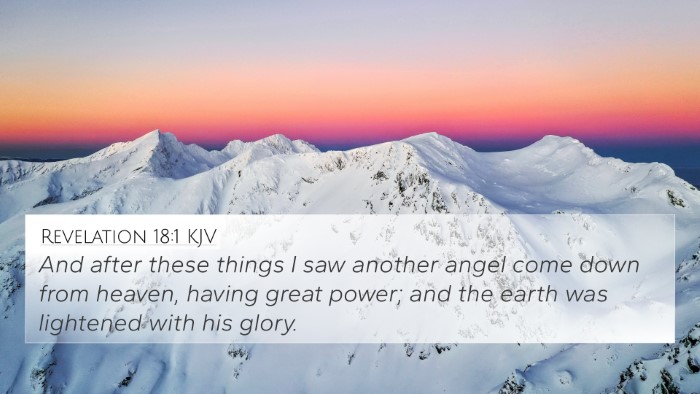
Revelation 18:1 (KJV) »
And after these things I saw another angel come down from heaven, having great power; and the earth was lightened with his glory.

Genesis 19:17 (KJV) »
And it came to pass, when they had brought them forth abroad, that he said, Escape for thy life; look not behind thee, neither stay thou in all the plain; escape to the mountain, lest thou be consumed.
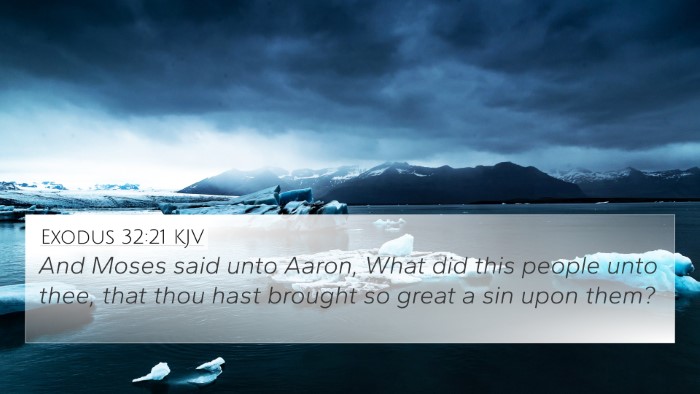
Exodus 32:21 (KJV) »
And Moses said unto Aaron, What did this people unto thee, that thou hast brought so great a sin upon them?
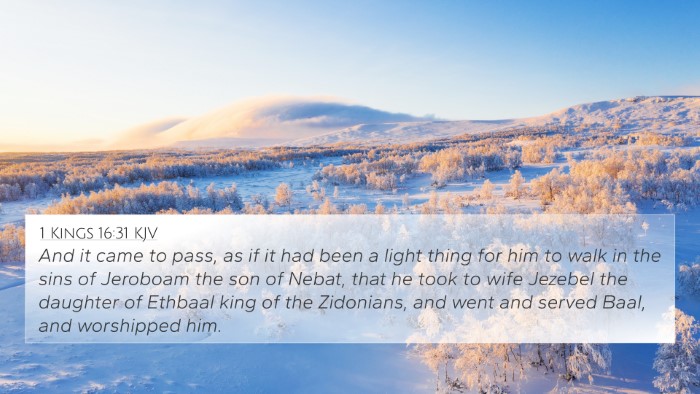
1 Kings 16:31 (KJV) »
And it came to pass, as if it had been a light thing for him to walk in the sins of Jeroboam the son of Nebat, that he took to wife Jezebel the daughter of Ethbaal king of the Zidonians, and went and served Baal, and worshipped him.
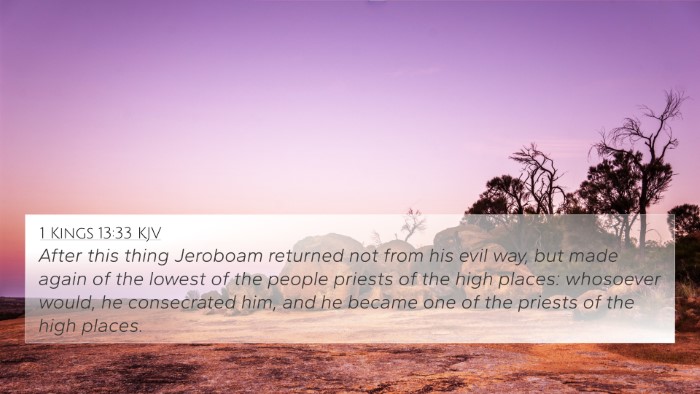
1 Kings 13:33 (KJV) »
After this thing Jeroboam returned not from his evil way, but made again of the lowest of the people priests of the high places: whosoever would, he consecrated him, and he became one of the priests of the high places.
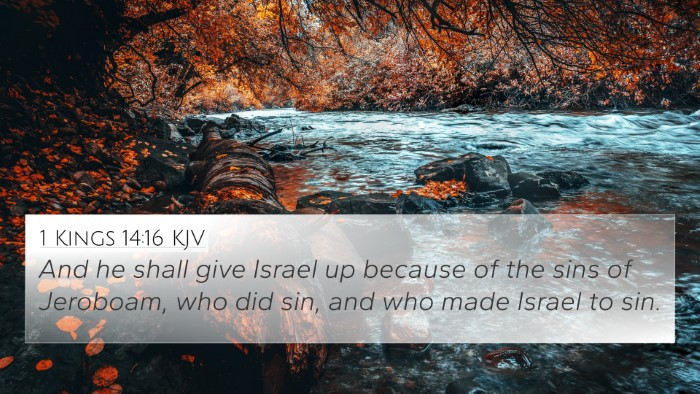
1 Kings 14:16 (KJV) »
And he shall give Israel up because of the sins of Jeroboam, who did sin, and who made Israel to sin.
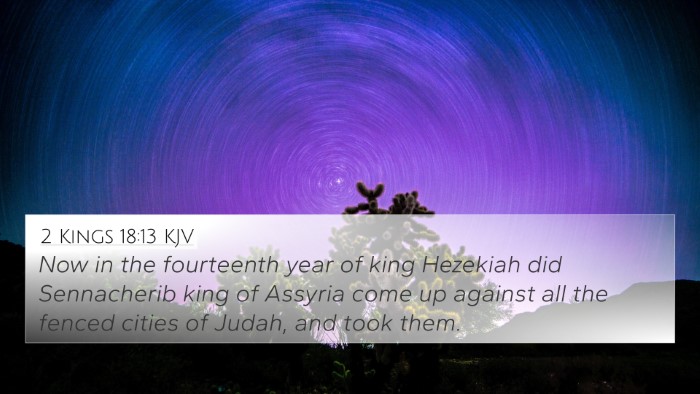
2 Kings 18:13 (KJV) »
Now in the fourteenth year of king Hezekiah did Sennacherib king of Assyria come up against all the fenced cities of Judah, and took them.
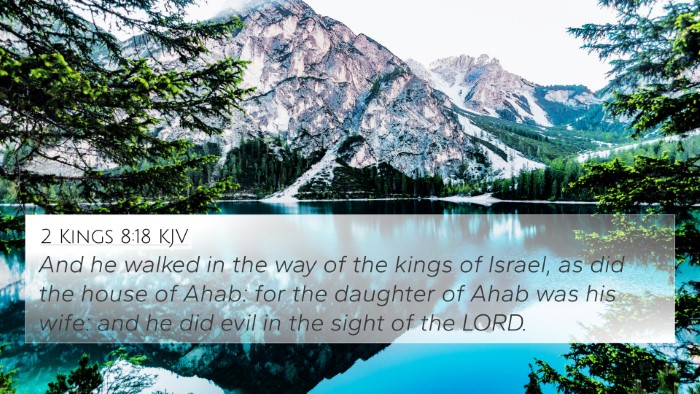
2 Kings 8:18 (KJV) »
And he walked in the way of the kings of Israel, as did the house of Ahab: for the daughter of Ahab was his wife: and he did evil in the sight of the LORD.

2 Kings 16:3 (KJV) »
But he walked in the way of the kings of Israel, yea, and made his son to pass through the fire, according to the abominations of the heathen, whom the LORD cast out from before the children of Israel.
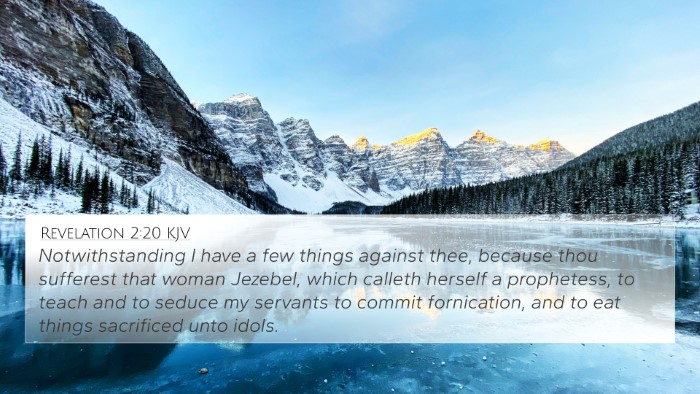
Revelation 2:20 (KJV) »
Notwithstanding I have a few things against thee, because thou sufferest that woman Jezebel, which calleth herself a prophetess, to teach and to seduce my servants to commit fornication, and to eat things sacrificed unto idols.
Micah 1:13 Verse Analysis and Similar Verses
Understanding Micah 1:13
Verse: Micah 1:13 - "O thou inhabitant of Lachish, bind the chariot to the swift beast: she is the beginning of the sin to the daughter of Zion: for the transgressions of Israel were found in thee."
Overview of Micah 1:13
This verse speaks to the impending judgment on Lachish, a city in Judah. It highlights the role of Lachish as a catalyst for Israel's sin and points towards the larger context of divine retribution due to the nation’s transgressions. Through a comparative analysis using public domain commentaries, we can garner deeper insights into this verse and its implications.
Commentary Insights
Matthew Henry's Commentary
Matthew Henry explains that Lachish is depicted as a significant contributor to the sins of Israel. Its inhabitants are being warned as they will face consequences due to the wrongdoing originating from their actions. This makes Lachish symbolic of the broader spiritual decline in Israel, where local sins have national repercussions.
Albert Barnes' Commentary
According to Albert Barnes, the mention of binding the chariot implies urgency and readiness for judgment. The phrase signifies that the sins of Lachish were substantial enough to attract the attention of divine judgment. Lachish's role as a “beginning of sin” emphasizes the interconnectedness of wrongdoing within the community and foreshadows the severe consequence awaiting them.
Adam Clarke's Commentary
Adam Clarke correlates Lachish's sins to a broader theme of collective guilt amongst the Israelites. He explains that the reference to the "swift beast" is meant to convey the swiftness of approaching judgment. Clarke's analysis reminds readers of the importance of recognizing personal and communal accountability to God.
Thematic Connections in the Bible
The themes in Micah 1:13 connect with many Biblical concepts, including communal guilt, divine judgment, and the call for repentance. Below are relevant cross-references to enrich understanding of this verse:
- Isaiah 10:6: "I send him against a hypocritical nation..." - This verse reflects God's judgment on nations for their hypocrisy, comparable to Lachish's role in the sin of Israel.
- Jeremiah 22:18-19: "Therefore thus says the Lord concerning Jehoiakim..." - A study of judgment on those in power, hence connecting to the accountability of Lachish.
- Ezekiel 3:18: "When I say to the wicked, 'You shall surely die'..." - The warning given to the wicked reflects the condemnation of sin seen in Micah.
- Hosea 8:13: "They sacrifice flesh for the sacrifices of My offerings..." - Commentary on Israel's sins aligns with the sin of Lachish as a starting point for Israel's failings.
- Amos 3:2: "You only have I chosen of all the families of the earth..." - Illustrates the special relationship and accountability of Israel's sins impacting their fate.
- Micah 2:5: "Therefore you will have no one to determine boundaries by lot..." - Conveys consequences of sin and judgment, mirroring Micah 1:13 themes.
- Deuteronomy 28:45-46: "All these curses shall come upon you..." - Curses due to disobedience parallels the impending judgment of Lachish.
- Proverbs 14:34: "Righteousness exalts a nation, but sin is a reproach to any people." - The deteriorating morality of Lachish is a testament to this principle.
- Matthew 23:37: "O Jerusalem, Jerusalem, the one who kills the prophets..." - A direct connection to the sins of the city and its inhabitants and God's sorrow over them parallels Ishach.
- Revelation 6:10: "How long, O Lord, holy and true..." - Reflects a lament over wrongs similar to the cries of God over the sins of Israel.
Applications for Study and Reflection
Understanding Micah 1:13 through these commentaries and cross-references offers profound insights into the relationships between sin, accountability, and divine judgment. For personal application and study, consider the following:
- Examine Personal Accountability: Reflect on how personal actions may influence larger community contexts.
- Study Cross-references: Utilize tools such as a Bible concordance or cross-reference guide to explore linked themes across scripture.
- Engage in Thematic Studies: Investigate parallel themes related to sin and community found throughout both the Old and New Testaments.
- Consider Prophetic Context: Study how prophetic warnings continue to be relevant in contemporary contexts.
- Group Discussion: Facilitate a Bible study discussing the implications of corporate sin as demonstrated in Micah.
Conclusion
Micah 1:13 provides a rich tapestry of meaning that resonates through various scripture connections and thematic explorations of divine accountability. Engaging with this verse through the lens of cross-referencing strengthens our understanding of its message and invites us to explore its relevance today. Through a comprehensive analysis of Biblical texts, one can uncover profound insights of faith and reflection.
